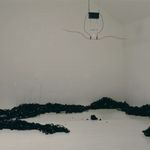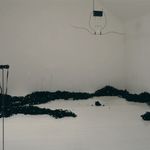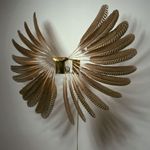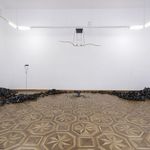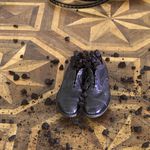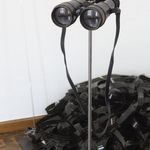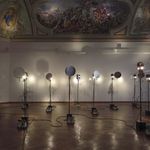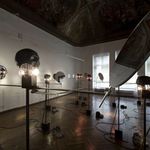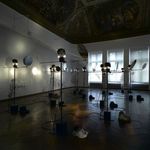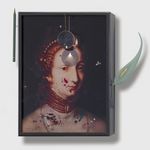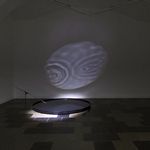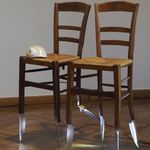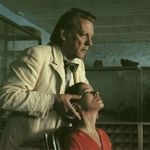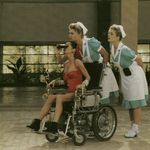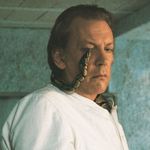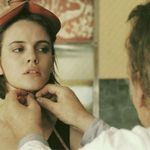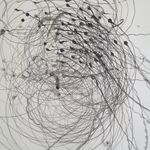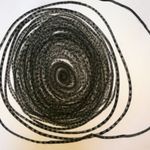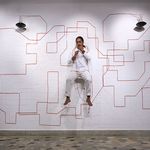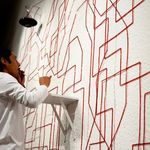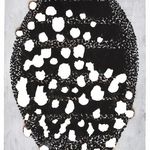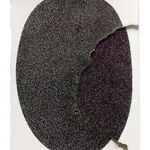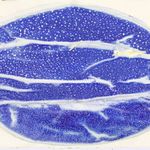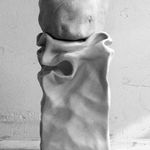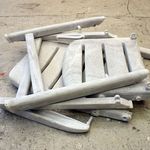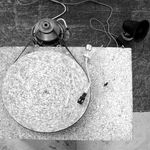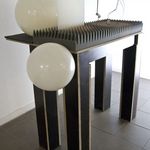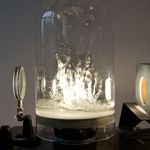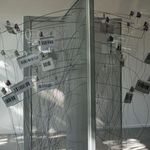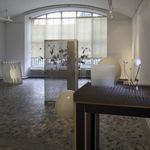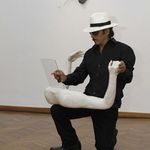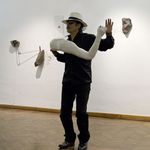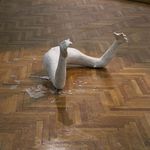Rebecca Horn & Guests
MARIBOR PROJECT / Rebecca Horn & Guests
UGM / Maribor Art Gallery, Strossmayerjeva 6
opening: Friday, 28 September 2012 at 19:00
opening speakers: Ronald Graetz, director of ifa, Hendrik E. Kloninger, director of Goethe-Institut Ljubljana and Dr Suzana Žilič Fišer, director - general of Maribor 2012 – European Capital of Culture
Rebecca Horn will be present at the exhibition opening.
Rebecca Horn, one of the most renowned contemporary artists in the world, exclusively for UGM presents part of her most acknowledged works, selected personally by the artist, comprising installations, mechanised sculptures and drawings. Rebecca Horn also selected works by guest artists, who represent one of the most exciting trends in the contemporary art, comprising sculpture, objects, installations and films. The artworks are brought into a dialogue with each other through content, material, form and sound connections, as the core of exhibition installation that creates unique course and sound experience. The show is Horn's first exhibition in Slovenia and one of the highlights of European Capital of Culture Maribor 2012. Maribor Project will be accompanied with exciting and varied programme, including artist talk with Rebecca Horn, projection of Rebecca Horn's film oeuvre, music performances, art workshops, led by guest artists and literature evening with internationally renowned guests Joachim Sartorius, Rod Mengham and Tomaž Šalamun. The exhibition opening will feature opening performance Blood drawing in wine by performance artist Antonio Paucar and presentation of a music composition, written by saxophonist and composer Hayden Chisholm especially for Rebecca Horn's installation.
Since the beginning of the 1970s, Rebecca Horn has been creating an oeuvre consisting of an ever-growing flow of performances, films, sculptures, spatial installations, drawings and photographs. The distinctive character of her world of images consists in the extremely precise physical and technical functionality with which the artist presents her sculptures and the sequences of movements they perform in spaces. The most frequently recurring themes in Horn's work are sexuality, human vulnerability and emotional fragility, which illustrates the richness and complexity of her work. In the first performances, the body-extensions, she explores the equilibrium between body and space. In later works she replaces the human body with kinetic sculptures which take on their own life. Her new works define and cut through spaces with reflections of mirrors, light and music. Following the physical experience of her performances with body extensions, masks and feather objects of the 1970s came the first kinetic sculptures featured in her films such as The Feathered Prison Fan in Der Eintänzer (1978), or The Peacock Machine in La Ferdinanda (1981). Maribor exhibition will display feather kinetic object Large Feather Wheel (1997) made up of feathers and metal construction, that creates a fragile, elusive impression while in motion. In the late 1970s and early ‘80s Horn began to move away from body-centred art into more narrative work including a greater use of film. She used film initially to document her performances but since then has developed it into a new sphere of work, producing several feature films. The association between sculpture and film, which continues to be a key element of her work, is fully explored in the exhibition in works such as Time Goes By (1990/91), in which 40,000 metres of developed Hollywood film, thermometers, binoculars and copper snakes are presented in a mechanised installation in homage to tragic-comic actor Buster Keaton, whose shoes form the central focus of the installation. Installation Broken Landscape (1997) represents another, less serious aspect of Horn's work in which the stones are being stabbed. In the 1980s and 1990s huge installations were created out of and dedicated to places charged with political and historical importance, for example Tower of the Nameless (1994) and Concert for Buchenwald (1999). One of the key elements of the installations were mechanically playing instruments such as violins, cellos and drums, conveying the sound experience of certain space. Several mechanically playing instruments will be incorporated at UGM exhibition. Musical instruments, incorporated into installations open the sonic dimension of Horn's work, which has recently been accompanied by the vocal and instrumental compositions of Hayden Chisholm, pieces of music that combine gracefully with the installations in their subtlety, fragility and hint at the unspeakable.
Rebecca Horn (1944) has had her work exhibited in many leading museums and galleries in Europe and America. Rebecca Horn’s works have been shown in solo exhibitions at leading international institutions: at the Staatliche Kunsthalle Baden-Baden (1981), the M.O.C.A. Los Angeles (1990), the Guggenheim Museum New York (1993), Stedelijk Van Abbemuseum, Eindhoven (1993), the Nationalgalerie Berlin (1994), the Serpentine Gallery London (1994), the Tate Gallery London (1994), Kunsthalle Wien, Vienna (1994), the Kestner Gesellschaft Hannover (1997), Carré d’Art, Nimes (2000) and K20, Düsseldorf (2005). She has two rooms dedicated to her work at Tate Modern. Horn has been included in many major international group exhibitions, such as Sculptur Project, Munster (1997 and 1999), and Documenta, Kassel (1972, 1982, 1986) and ROSC ’88, Dublin. She has received numerous honours and prizes for her work, including the documenta-Preis(1986), a US Carnegie Prize (1988), Performing Oscar Wilde (1988), the Imperial ring of the city of Goslar (1992), the Barnett and Annalee Newman Award (2004), Hans-Molfenter-Preis, Stuttgart (2005), Piepenbrock Preis für Skulptur, Berlin (2006 ), Alexej von Jawlensky-Preis der Landeshauptstadt Wiesbaden (2007), Alice Salomon Poetik Preis, Berlin (2009), Hessischer Kulturpreis, Wiesbaden (2010), Praemium Imperiale, Tokyo (2010) and Grande Médaille des Arts Plastiques, Académie d’Architecture de Paris (2011). She was a professor at the Berlin University of the Arts untill 2009. She lives and works in Paris and Berlin.
Exhibition was made in coproduction of UGM / Maribor Art Gallery, ifa, Institute for Foreign Cultural Relations, MARIBOR 2012 – Europena Capital of Culture as part of the project Art Always Wins/Terminal 12 and in cooperation with Goethe-Institut Ljubljana.
guest artists, participating at the exhibition: Matthias Deumlich, Ali Kaaf, Antonio Paucar, Jakob Schaible, Markus Wüste
special guests: Hayden Chisholm, Yang Lian, Rod Mengham, Joachim Sartorius and Tomaž Šalamun
production: Institut für Auslandsbeziehungen e. V. (ifa) / Institute for Foreign Cultural Relations
initiator: Goethe-Institute Ljubljana
coproduction: MARIBOR 2012 – European Capital of Culture, Art Always Wins / Terminal 12
sponsor: Moontower Foundation
Guest artists
ANNOUNCING MARIBOR PROJECT / REBECCA HORN & GUESTS AT EUROPEAN CAPITAL OF CULTURE MARIBOR 2012
Wednesday, 26 September 2012 at 18:00, Literary House Maribor, Vojašniška ul. 12
As part of the gostiM Besedo project, Aleš Šteger will talk to chinese poet Yang Lian. Collaboration between Slovenian Poet Society and EPK Maribor.
Thursday, 27 September 2012 at 16:00-18:00, Conservatory of music and ballet Maribor, Mladinska ul. 12
Music workshop held by composer and saxophonist Hayden Chisholm.
Thursday, 27 September 2012 at 19:00, Slovene National Theatre Maribor, Kazinska Hall, Slovenska ul. 27
Talk with the artist Rebecca Horn as part of the project TWELVE. In conversation with Aleš Šteger.
Saturday, 29 September 2012 at 11:00, UGM, Strossmayerjeva ul. 6
Guided tour with guest artists.
Saturday, 29 September 2012 at 18:00, UGM, Strossmayerjeva ul. 6
Literature evening Rebecca Horn with Rod Mengham, Joachim Sartorius, Tomaž Šalamun.
Saturday, 29 September 2012 at 21:30, Jazz Club Satchmo, Strossmayerjeva ul. 6
Concert by Hayden Chisholm (saxophone, drums) and Pedja Avramovic (Hammond organ).
Sunday, 30 September 2012 at 11:00, Cinema Udarnik, Grajski trg 1
Projection of Rebecca Horn's film Buster's Bedroom.
ifa/ Institut für Auslandsbeziehungen e. V.
Goethe-Institut Ljubljana
Realisation of UGM programme has been made possible with the help of:
